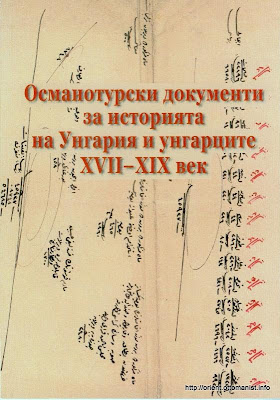Ottoman Turkish Documents About The History of Hungary and the Hungarians: 17th - 19th century
Stoyan Shivarov, 2013 г.
price: 15 €; contact us at:  or here
or here
This publication includes 25 comprehensive annotations (in Bulgarian with English preface) of documents from archival fond 316 (Hungary) preserved in the ‘Oriental Collections’ Department of the ‘Sts. Cyril and Methodius’ National Library of Bulgaria. Hüccet-s are particularly abundant. Still other types are also present: registers, requests and pleas, receipts, minutes, and sultans’ orders. With the notable exception of a single article on Hungarian emigration of 1848-1849 by Boris Nedkov, these documents were in obscurity and completely outside the scope of researchers until now.
The structure of the annotations presented is fairly standard with main criteria being chronological. The earliest document is from 1658 while the latest is from 1861. The documents from the 17th century are concentrated between 1658–1687, a period of struggle between the Ottomans and the Christian powers of the West lead by the Habsburgs. This eventually culminated in a series of hot conflicts of 1663–1664 and especially in the 1683–1699 War of the Holy League. The latter put an end to Ottoman rule over Hungary for good.
The documents from the 19th century deal predominantly with large scale emigration after the rout of the 1848 Springtime of the Peoples. More specifically it addresses the refuge which Lajos Kossuth and many of his supporters sought, and to some extent found, inside the Ottoman Empire. In August 1849 the leader of the Hungarian revolution together with his entourage arrived at the border of the Ottoman town of Vidin. Not long after that, survivors from the Polish and Italian legions also temporarily settled here. Part of the emigrants converted to Islam, acquired new Muslim names and immediately gained a place in the Ottoman army and those who resisted such proselytic aspirations were removed by the Ottoman government to the town of Shumen. After several there months the emigrant leaders were deported again, this time to Kütahya in Asia Minor. All these events are presented in the annotated documents, although they are registered with the dry neutral tongue of the Ottoman administrative machine.
The addition of facsimile copies allows specialists to acquire better information on the paleography and linguistic varieties of the original Ottoman Turkish text.
